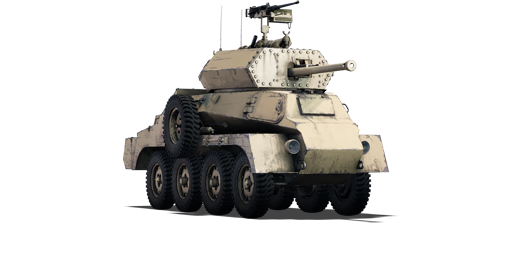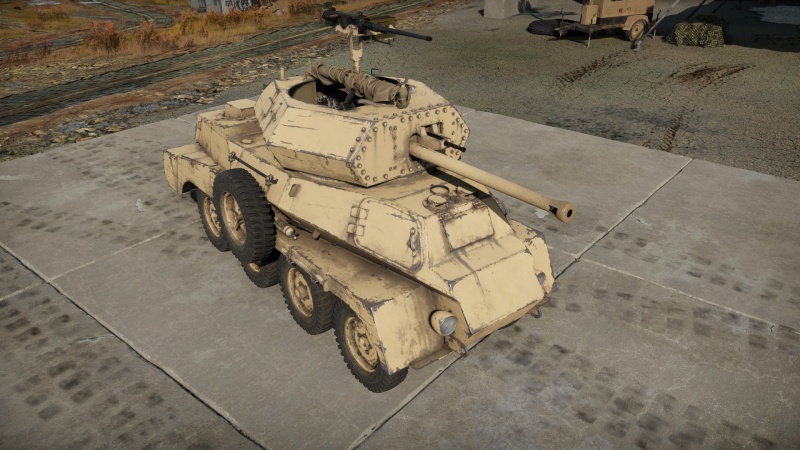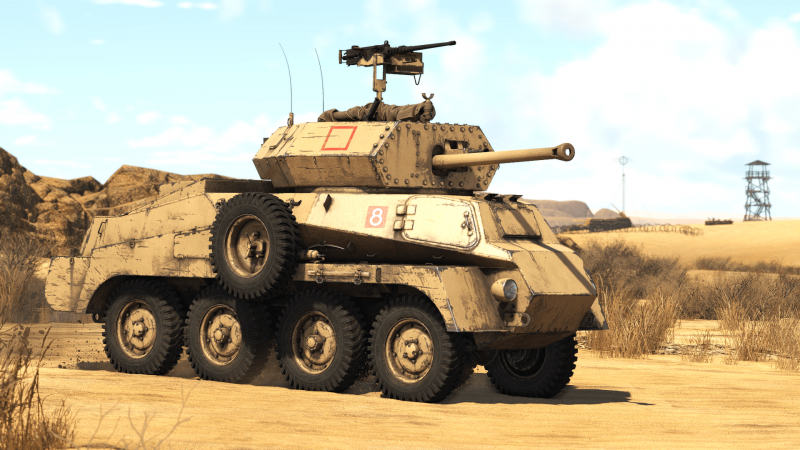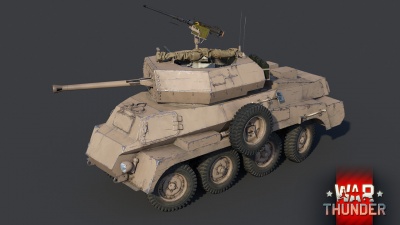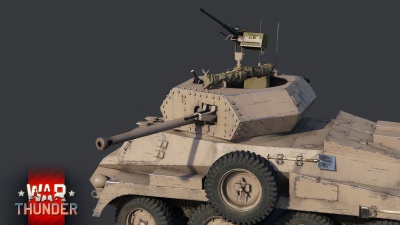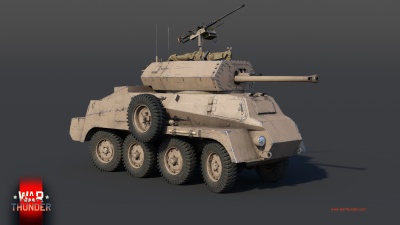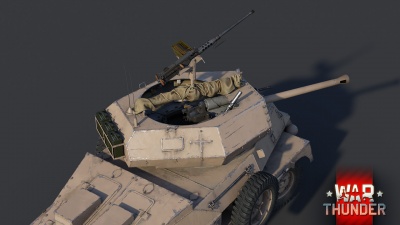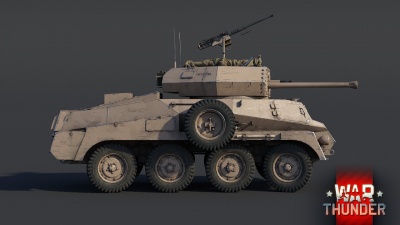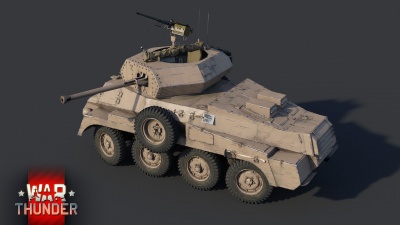Difference between revisions of "SARC MkVI (6pdr)"
m (New specs-card image) |
(→Machine guns) |
||
| Line 41: | Line 41: | ||
=== Mobility === | === Mobility === | ||
| − | {{Specs-Tank-Mobility}} | + | {{Specs-Tank-Mobility}} |
<!-- ''Write about the mobility of the ground vehicle. Estimate the specific power and manoeuvrability, as well as the maximum speed forwards and backwards.'' --> | <!-- ''Write about the mobility of the ground vehicle. Estimate the specific power and manoeuvrability, as well as the maximum speed forwards and backwards.'' --> | ||
{{tankMobility|abMinHp=294|rbMinHp=168}} | {{tankMobility|abMinHp=294|rbMinHp=168}} | ||
| − | The SARC has a good power to weight ratio of 17 hp/ton, allowing it to reach a respectable top speed of over 60 km/h fairly quickly on roads. Off road performance, however, is lacking as the vehicle is wheeled, light and without a powerful engine. It will struggle progressing through mud, snow, sand or when going uphill. Furthermore, its light weight means the vehicle can be even stopped by minor obstacles (walls, trees, fences, etc.) that medium Tanks would just run through with next to no loss of speed. Thanks to its good acceleration, any lost speed can be regained fairly quickly. Wheels don't turn on the spot, so manoeuvring in confined spaces can be difficult and time consuming. | + | The SARC has a good power to weight ratio of 17 hp/ton, allowing it to reach a respectable top speed of over 60 km/h fairly quickly on roads. Off road performance, however, is lacking as the vehicle is wheeled, light and without a powerful engine. It will struggle progressing through mud, snow, sand or when going uphill. Furthermore, its light weight means the vehicle can be even stopped by minor obstacles (walls, trees, fences, etc.) that medium Tanks would just run through with next to no loss of speed. Thanks to its good acceleration, any lost speed can be regained fairly quickly. Wheels don't turn on the spot, so manoeuvring in confined spaces can be difficult and time consuming. |
=== Modifications and economy === | === Modifications and economy === | ||
| Line 160: | Line 160: | ||
! Mount !! Capacity (Belt) !! Fire rate !! Vertical !! Horizontal | ! Mount !! Capacity (Belt) !! Fire rate !! Vertical !! Horizontal | ||
|- | |- | ||
| − | | Pintle || | + | | Pintle || 600 (200) || 577 || -5°/+40° || ±180° |
|- | |- | ||
|} | |} | ||
| Line 169: | Line 169: | ||
! Mount !! Capacity (Belt) !! Fire rate !! Vertical !! Horizontal | ! Mount !! Capacity (Belt) !! Fire rate !! Vertical !! Horizontal | ||
|- | |- | ||
| − | | Coaxial || 2, | + | | Coaxial || 2,025 (225) || 600 || N/A || N/A |
|- | |- | ||
|} | |} | ||
| Line 176: | Line 176: | ||
<!-- ''Describe the tactics of playing in the vehicle, the features of using vehicles in the team and advice on tactics. Refrain from creating a "guide" - do not impose a single point of view but instead give the reader food for thought. Describe the most dangerous enemies and give recommendations on fighting them. If necessary, note the specifics of the game in different modes (AB, RB, SB).'' --> | <!-- ''Describe the tactics of playing in the vehicle, the features of using vehicles in the team and advice on tactics. Refrain from creating a "guide" - do not impose a single point of view but instead give the reader food for thought. Describe the most dangerous enemies and give recommendations on fighting them. If necessary, note the specifics of the game in different modes (AB, RB, SB).'' --> | ||
| − | In battle, the {{PAGENAME}} should be used similar to the [[Sd.Kfz.234/2|Puma armoured cars]], focus on using its speed for quick flanking attacks and scouting targets. Be wary on the terrain the {{PAGENAME}} travels in as the vehicle is quite top heavy. In a scenario where you cannot flank, try to do quick strikes at the enemy. Avoid sniping and frontline combat as, like the Pumas, it has little armour and cannot take cannon fire. | + | In battle, the {{PAGENAME}} should be used similar to the [[Sd.Kfz.234/2|Puma armoured cars]], focus on using its speed for quick flanking attacks and scouting targets. Be wary on the terrain the {{PAGENAME}} travels in as the vehicle is quite top heavy. In a scenario where you cannot flank, try to do quick strikes at the enemy. Avoid sniping and frontline combat as, like the Pumas, it has little armour and cannot take cannon fire. |
=== Pros and cons === | === Pros and cons === | ||
| Line 215: | Line 215: | ||
=== [[wt:en/news/7075-development-sarc-mk-vi-elephant-in-the-bushes-en|Devblog]] === | === [[wt:en/news/7075-development-sarc-mk-vi-elephant-in-the-bushes-en|Devblog]] === | ||
| − | In 1938, South African engineers began development of a domestic armoured car design. Following the outbreak of WWII, the development of the vehicle was accelerated and a design around a 3 ton Ford truck chassis was created. However, as the South African industry | + | In 1938, South African engineers began development of a domestic armoured car design. Following the outbreak of WWII, the development of the vehicle was accelerated and a design around a 3 ton Ford truck chassis was created. However, as the South African industry wasn't developed enough to manufacture all components domestically, many had to be imported from other countries, such as the US, Canada and the UK with final assembly then taking place locally. |
| − | The SARC entered service with South African forces in 1940 and gradually found its way into the ranks of many of the allied | + | The SARC entered service with South African forces in 1940 and gradually found its way into the ranks of many of the allied nations' units, especially those of the Commonwealth, over the next few years. The vehicle quickly gained a reputation among its crews for its simplicity and reliability, despite it being considered rather light and undergunned. |
| − | At the height of WWII, in 1942 - 1943, the engineers behind the SARC sought to improve the | + | At the height of WWII, in 1942 - 1943, the engineers behind the SARC sought to improve the vehicle's capabilities in an effort to match the German Sd.Kfz. 234. To that extent, the engineers developed the heavier, 8-wheeled experimental Mark V variant, followed by the improved Mark VI prototypes. |
Only two prototypes of the SARC Mk.VI were built, one being armed by a 2 pdr and the other with a 6 pdr gun. While the former was sent to the UK for testing, the latter remained in South Africa. Despite favorable test results, the increased availability of more suitable American armoured cars in the later stages of the war made the Mark VI somewhat redundant and further development was cancelled. | Only two prototypes of the SARC Mk.VI were built, one being armed by a 2 pdr and the other with a 6 pdr gun. While the former was sent to the UK for testing, the latter remained in South Africa. Despite favorable test results, the increased availability of more suitable American armoured cars in the later stages of the war made the Mark VI somewhat redundant and further development was cancelled. | ||
| Line 261: | Line 261: | ||
{{TankManufacturer Marmon-Herrington}} | {{TankManufacturer Marmon-Herrington}} | ||
{{Britain light tanks}} | {{Britain light tanks}} | ||
| − | |||
[[Category:Wheeled ground vehicles]] | [[Category:Wheeled ground vehicles]] | ||
Revision as of 13:14, 27 August 2022
Contents
Description
The SARC MkVI (6pdr) is a rank II British light tank with a battle rating of 3.0 (AB) and 3.3 (RB/SB). It was introduced in Update "Ixwa Strike".
With an improvement in firepower and yet very fast, this latter SARC variant covers most of the cons of the earlier 2-pounder version, almost without new disadvantages; perfect for admirers of fast or scouting vehicles such as the Cromwell I and Crusader III.
While externally the SARC MkVI 6-pounder might not seem intimidating to some players, the potential of these light tanks should not be undervalued under any circumstances. The well-known 57 mm QF gun is capable of precisely and quickly dispatching even the heaviest of the tanks at the battle rating, such as the mighty KV-1 series.
The less advantageous aspect remains the sacrifices in the armour of the SARC chassis and the reduced crew inside the fighting compartment. This shortage of armour sends the tank straight to flanking and ambushing tactics, away from prolonged frontal engagements. It only takes a well-aimed shot to the turret to be back on the garage.
General info
Survivability and armour
While it can survive some MG fire from the front, HMGs will penetrate the sides even from a distance, quickly destroying the SARC. Autocannons are even more dangerous as they will shred through the armour regardless of the distance or angle. Armour-piercing shots fired by tanks will sometimes just pass through the vehicle's armour without detonating but knocking out a crew member or more. The SARC is not a vehicle that should be exposed to enemy fire while expecting it to resist or shrug it.
Armour type:
| Armour | Front (Slope angle) | Sides | Rear | Roof |
|---|---|---|---|---|
| Hull | ___ mm | ___ mm Top ___ mm Bottom |
___ mm | ___ - ___ mm |
| Turret | ___ - ___ mm Turret front ___ mm Gun mantlet |
___ - ___ mm | ___ - ___ mm | ___ - ___ mm |
| Cupola | ___ mm | ___ mm | ___ mm | ___ mm |
Notes:
Mobility
| Game Mode | Max Speed (km/h) | Weight (tons) | Engine power (horsepower) | Power-to-weight ratio (hp/ton) | |||
|---|---|---|---|---|---|---|---|
| Forward | Reverse | Stock | Upgraded | Stock | Upgraded | ||
| Arcade | 72 | 21 | 11.2 | 294 | 363 | 26.25 | 32.41 |
| Realistic | 65 | 19 | 168 | 190 | 15 | 16.96 | |
The SARC has a good power to weight ratio of 17 hp/ton, allowing it to reach a respectable top speed of over 60 km/h fairly quickly on roads. Off road performance, however, is lacking as the vehicle is wheeled, light and without a powerful engine. It will struggle progressing through mud, snow, sand or when going uphill. Furthermore, its light weight means the vehicle can be even stopped by minor obstacles (walls, trees, fences, etc.) that medium Tanks would just run through with next to no loss of speed. Thanks to its good acceleration, any lost speed can be regained fairly quickly. Wheels don't turn on the spot, so manoeuvring in confined spaces can be difficult and time consuming.
Modifications and economy
Armaments
Main armament
The SARC MkVI (6pdr) is equipped with the 6-pounder gun, a common feature of British tanks at this rank. The gun has a very fast reload (provided the 10-round ready rack is not depleted) and has relatively good penetration at this battle rating. However, as is typical with most British vehicles, it only fires solid shot ammunition with no explosive filler. Due to the relatively small calibre, the spalling of the solid shot upon penetration is not particularly extensive, and it will often require multiple penetrations at different parts of the target in order to guarantee the destruction of the enemy vehicle.
| 57 mm 6pdr OQF Mk.III | Turret rotation speed (°/s) | Reloading rate (seconds) | |||||||||||
|---|---|---|---|---|---|---|---|---|---|---|---|---|---|
| Mode | Capacity | Vertical | Horizontal | Stabilizer | Stock | Upgraded | Full | Expert | Aced | Stock | Full | Expert | Aced |
| Arcade | 60 | -10°/+20° | ±180° | Shoulder | 34.3 | 47.4 | 57.6 | 63.7 | 67.8 | 5.20 | 4.60 | 4.24 | 4.00 |
| Realistic | 21.4 | 25.2 | 30.6 | 33.8 | 36.0 | ||||||||
Ammunition
| Penetration statistics | |||||||
|---|---|---|---|---|---|---|---|
| Ammunition | Type of warhead |
Penetration @ 0° Angle of Attack (mm) | |||||
| 10 m | 100 m | 500 m | 1,000 m | 1,500 m | 2,000 m | ||
| Shot Mk.5 | AP | 101 | 97 | 82 | 66 | 53 | 43 |
| Shell Mk.10 | HE | 9 | 9 | 9 | 9 | 9 | 9 |
| Shot Mk.5 HV | AP | 108 | 104 | 87 | 70 | 57 | 46 |
| Shot Mk.8 | APC | 110 | 106 | 89 | 72 | 59 | 48 |
| Shot Mk.9 | APCBC | 122 | 118 | 101 | 84 | 70 | 58 |
| Shell details | |||||||||
|---|---|---|---|---|---|---|---|---|---|
| Ammunition | Type of warhead |
Velocity (m/s) |
Projectile Mass (kg) |
Fuse delay (m) |
Fuse sensitivity (mm) |
Explosive Mass (TNT equivalent) (g) |
Ricochet | ||
| 0% | 50% | 100% | |||||||
| Shot Mk.5 | AP | 815 | 2.8 | N/A | N/A | N/A | 47° | 60° | 65° |
| Shell Mk.10 | HE | 655 | 2.72 | 0 | 0.1 | 590 | 79° | 80° | 81° |
| Shot Mk.5 HV | AP | 853 | 2.8 | N/A | N/A | N/A | 47° | 60° | 65° |
| Shot Mk.8 | APC | 853 | 2.87 | N/A | N/A | N/A | 48° | 63° | 71° |
| Shot Mk.9 | APCBC | 801 | 3.23 | N/A | N/A | N/A | 48° | 63° | 71° |
Ammo racks
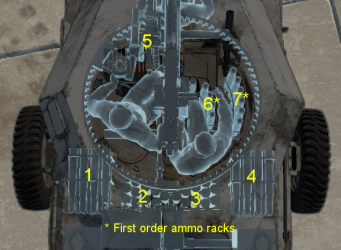
| Full ammo |
1st rack empty |
2nd rack empty |
3rd rack empty |
4th rack empty |
5th rack empty |
6th rack empty |
7th rack empty |
Visual discrepancy |
|---|---|---|---|---|---|---|---|---|
| 60 | 49 (+11) | 38 (+22) | 27 (+33) | 15 (+45) | 11 (+49) | 7 (+53) | 1 (+59) | Yes |
Notes:
- The visual discrepancy concerns rack 4 that displays 1 shell in the rack even when empty.
- Shells are modeled individually and disappear after having been shot or loaded.
- Racks 6 and 7 are first stage ammo racks. They total 10 shells and get filled first when loading up the tank.
- These racks are also emptied early: the rack depletion order at full capacity is: 6 - 7 - 1 - 2 - until 5.
- Simply not firing when the gun is loaded will move ammo from racks 1-5 into rack 7 then 6. Firing will interrupt the restocking of the ready racks.
- The SARC MkVI (6pdr) is the only vehicle below Rank IV to get a first order ammo rack. Once the rack is depleted, the reload is significantly slower.
Machine guns
The SARC MkVI (6pdr) is one of the few British ground vehicles (other than Lend-Lease vehicles such as the Sherman II) to be armed with a pintle-mounted .50 cal Browning heavy machine gun. This machine gun gives considerable added firepower to the SARC MkVI (6pdr). It provides some measure of defence against aircraft and is also effective against lightly armoured targets such as most contemporary SPAA, against which the poor HE round of the 6-pdr main gun might struggle or the solid shot will do little to no damage without hitting the ammunition.
| 12.7 mm M2HB | ||||
|---|---|---|---|---|
| Mount | Capacity (Belt) | Fire rate | Vertical | Horizontal |
| Pintle | 600 (200) | 577 | -5°/+40° | ±180° |
| 7.92 mm BESA | ||||
|---|---|---|---|---|
| Mount | Capacity (Belt) | Fire rate | Vertical | Horizontal |
| Coaxial | 2,025 (225) | 600 | N/A | N/A |
Usage in battles
In battle, the SARC MkVI (6pdr) should be used similar to the Puma armoured cars, focus on using its speed for quick flanking attacks and scouting targets. Be wary on the terrain the SARC MkVI (6pdr) travels in as the vehicle is quite top heavy. In a scenario where you cannot flank, try to do quick strikes at the enemy. Avoid sniping and frontline combat as, like the Pumas, it has little armour and cannot take cannon fire.
Pros and cons
Pros:
- Effective firepower with the 6-pdr gun and 12.7 mm heavy machine gun.
- High speed on optimal hard terrain (roads, fields, and cities).
- Frontal turret armour can withstand heavy machine gun fire at range.
- Useful amount of smoke grenades (26).
- Fast reload (when the ready rack is filled).
Cons:
- Poor survivability (weak flank armour and open top, with only 3 crew members).
- Unreliable, relatively small calibre solid shot ammunition.
- Tall profile and pintle-mounted heavy machine gun can give away tank's location.
- Limited off-road mobility on snow, mud, and sand.
- Recoil of the 6-pdr can hinder target acquisition; more notable when firing from the sides.
- Once the ready rack is emtpy, the reload slows down noticeably.
History
Development
The Marmon-Herrington Mk V (a.k.a. South African Reconnaissance Car/SARC Mk V) was an eight wheeled armored car prototype produced by the Marmon-Herrington Corporation for South Africa. It was much too heavy at 16 tonnes so a project for a lighter armored car was created, designated as the Mk VI. Questions were raised as to the armament of the vehicle so two prototypes were developed with different turrets mounting the 2pdr and 6pdr guns respectively.[1]
Design
The Mk VI featured a new 8x8 chassis with independent suspension and steering for the front and rear axles. The hull was taller than the Mk V but was much lighter at 11,185 kilograms - over five tonnes less than the Mk V. The rear engine compartment was fitted with two Ford V8 95 horsepower engines (190 horsepower total) and a four forward, one reverse gear transmission. This allowed the Mk VI to attain a speed of 65 kilometers per hour and a range of 400 kilometers on road. Though fitted with different turrets, both prototypes had a radio station in the turret bustle.
The second prototype mounted the 57 mm Ordnance QF 6-pounder gun in an open-topped turret. The 6-pounder turret was crewed by two men - gunner and commander/loader - which made a total of three crew members in the vehicle. Two machine guns were provided: a coaxial 7.92 mm Besa machine gun and a pintle-mounted 12.7 mm (.50 cal) M2 machine gun.[1][2]
Production and Service
Both prototypes were completed in 1943 and gained interest from the British Army. The first prototype (2-pounder) was sent to Britain and the second prototype (6-pounder) was retained in South Africa. 250 were ordered by the British Army but that order was cancelled when American armored cars like the M8 Greyhound became available. The second prototype can currently be found at the South African National Museum of Military History in Johannesburg, South Africa.[1][2]
Devblog
In 1938, South African engineers began development of a domestic armoured car design. Following the outbreak of WWII, the development of the vehicle was accelerated and a design around a 3 ton Ford truck chassis was created. However, as the South African industry wasn't developed enough to manufacture all components domestically, many had to be imported from other countries, such as the US, Canada and the UK with final assembly then taking place locally.
The SARC entered service with South African forces in 1940 and gradually found its way into the ranks of many of the allied nations' units, especially those of the Commonwealth, over the next few years. The vehicle quickly gained a reputation among its crews for its simplicity and reliability, despite it being considered rather light and undergunned.
At the height of WWII, in 1942 - 1943, the engineers behind the SARC sought to improve the vehicle's capabilities in an effort to match the German Sd.Kfz. 234. To that extent, the engineers developed the heavier, 8-wheeled experimental Mark V variant, followed by the improved Mark VI prototypes.
Only two prototypes of the SARC Mk.VI were built, one being armed by a 2 pdr and the other with a 6 pdr gun. While the former was sent to the UK for testing, the latter remained in South Africa. Despite favorable test results, the increased availability of more suitable American armoured cars in the later stages of the war made the Mark VI somewhat redundant and further development was cancelled.
Media
- Skins
- Images
See also
- Related development
External links
References
| Marmon-Herrington | |
|---|---|
| Vehicles for US Army | |
| Light tanks | M22 Locust |
| Vehicles for export | |
| Wheeled vehicles | SARC MkVI (2pdr) · SARC MkVI (6pdr) |
| Notes: | M22 Locust was designed by America for the US Army and British Army |
| Britain light tanks | |
|---|---|
| A13 | A13 Mk I · A13 Mk I (3rd R.T.R.) · A13 Mk II · A13 Mk II 1939 |
| A15 | Crusader II · Crusader "The Saint" · Crusader III |
| A17 | Tetrarch I |
| IFV | Warrior · Desert Warrior (Kuwait) |
| Wheeled | Daimler Mk II · AEC Mk II · Fox · Vickers Mk.11 |
| Other | VFM5 |
| South Africa | |
| SARC | SARC MkIVa · SARC MkVI (2pdr) · SARC MkVI (6pdr) |
| Ratel | Ratel 90 · Ratel 20 |
| Rooikat | Rooikat Mk.1D · Rooikat 105 · Rooikat MTTD |
| Other | Concept 3 · Eland 90 Mk.7 |
| USA | Stuart I · Stuart III |


